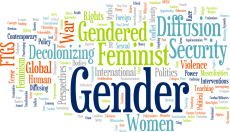
Email: ZYVC057@live.rhul.ac.uk
Total Article : 213
About Me:I'm a graduate student studying International Criminal Law and first started writing for King's News almost 4 years ago! My hobbies include reading, travelling and charity work. I cover many categories but my favourite articles to write are about mysteries of the ancient world, interesting places to visit, the Italian language and animals!

Studies recognise that when women participate actively in public and political life it optimises development objectives. Female participation is also a human right, meaning that all States must enforce it, according to article 3 of ICCPR and the CEDAW Convention. Women’s rights were recently discussed in reference to the 2030 goals to reach overall development. In the discussions, delegates and policy makers concluded that the rule of law plays large role in the implementation of women’s rights and gender equality. Much progress was made directly after CEDAW came to be, particularly in area of legislation. For example, in the last 40 years there has been a wave of anti-domestic violence legislation. In 1976, a few years prior to adoption of CEDAW in 1981, there was only one anti-violence legislation worldwide whereas as of 2017 there are over 120. Data collection on domestic violence has also increased. However, despite leaps and bounds in the area of legislation, discrimination impacts millions negatively across the globe.
Challenges:
A huge challenge is posed by discriminatory and unresponsive legal police and institutional frameworks. In these cases implementation lags behind legislation. This means that even is laws are set in place to protect women’s rights they may not be respected or enforced correctly. Alternatively, these laws may still meet resistance still to date in certain countries. There is a lot of political capital to be gained in respecting such legislation however there is a lot of unwillingness to pass from law to implementation.
Discrimination in law
In 2016 the World Bank conducted a survey of 173 countries. It revealed that almost 90% of countries surveyed have legal provisions that discriminate against women. Not only is this hard to believe but it also spreads to areas affecting the daily lives of women.
Women hold only around 15% of land titles which means inequality now related to a question of poverty. Land disputes are one of the key causes women go to court for a dispute in developing nations. Land is not only essential for property and food but it also allows an individual to use it as collateral for credit, say to take out a loan to set up a business or buy a house.
In 100 countries women face gender base job descriptions. In 18 countries women need to ask permission to get a job according to the law.
Sexual and gender based violence
According to a study by the World Health Organisation, percentages of unreported violence reaches 30 to 80 percent in several countries. In Guatemala only 3 percent of all reported sexual and gender based violence resulted in an actual judgement.
The main areas in which women in developing nations face discrimination are:
1. Access to land and property
2. Access to health
3. Access to food
Just to add to the list, it is worth mentioning that the global gender pay gap is 59%. Despite this, there is some positive news. Just a few weeks ago Iceland became the first nation in the world to make the gender pay gap illegal and it even put in a system to monitor companies so that the government can ensure the new legislation is respected.
Link: http://www.google.it/url?sa=i&rct=j&q=&esrc=s&source=images&cd=&ved=2ahUKEwi01bnF-ZbaAhXQKewKHZ6bBxYQjRx6BAgAEAU&url=http%3A%2F%2Fwww.isanet.org%2FISA%2FSections%2FFTGS&psig=AOvVaw09xgW_4qAsgwSH7PQOd5qW&ust=1522599023757694

0 Comment:
Be the first one to comment on this article.